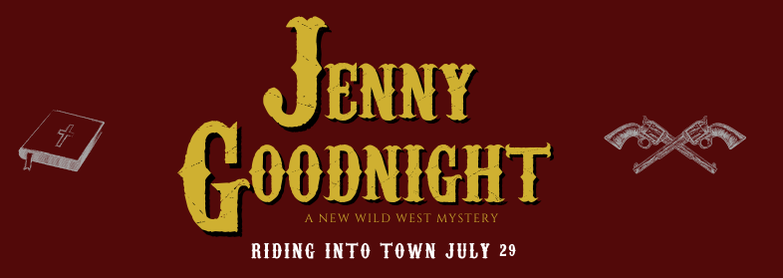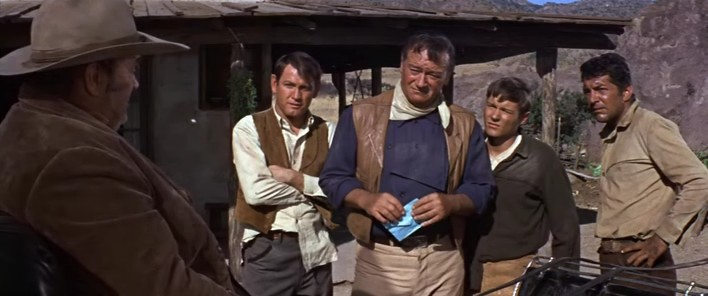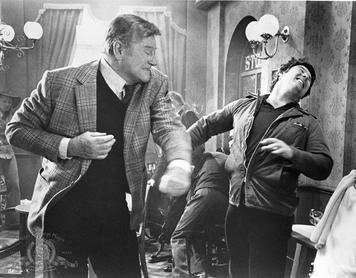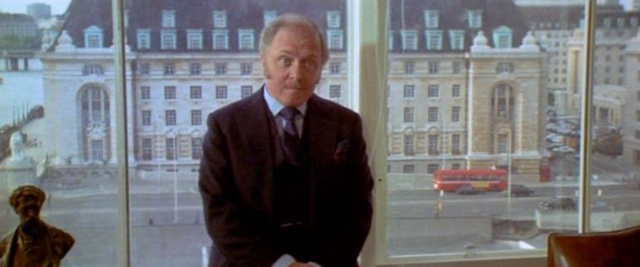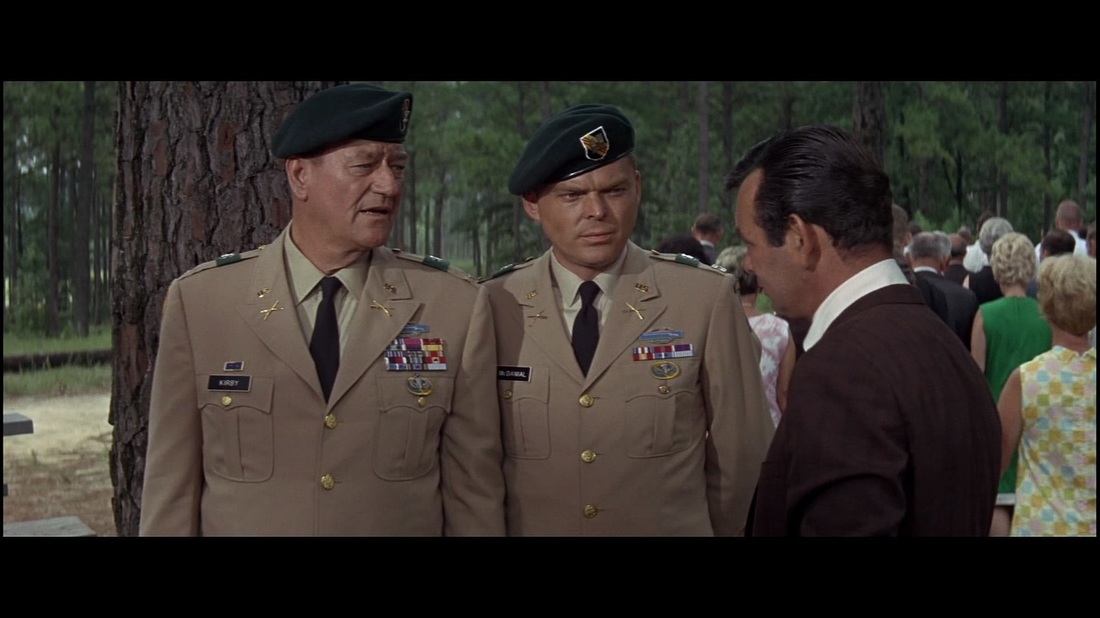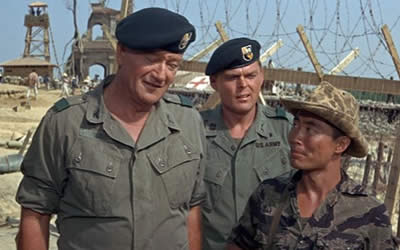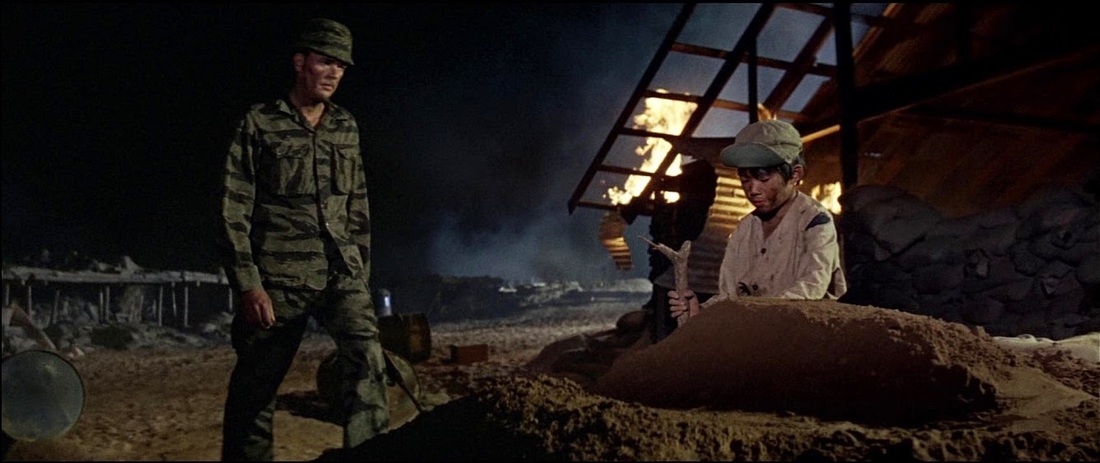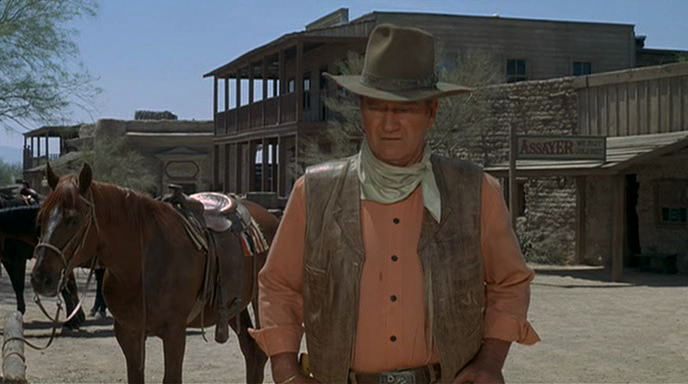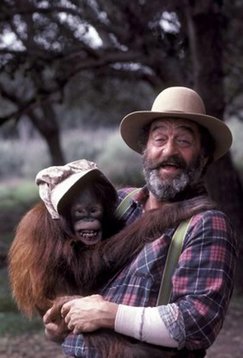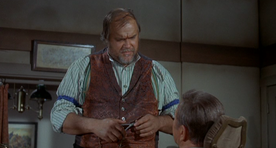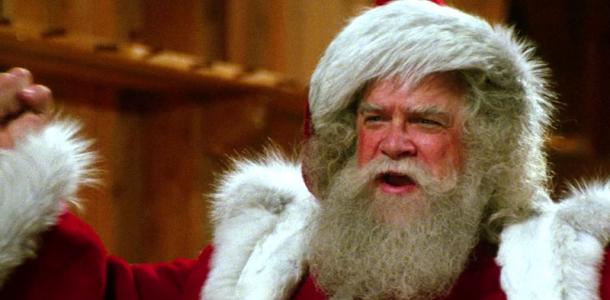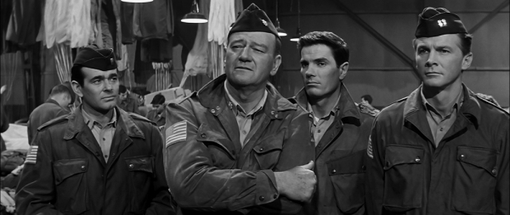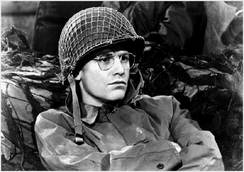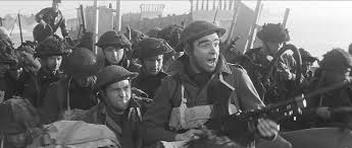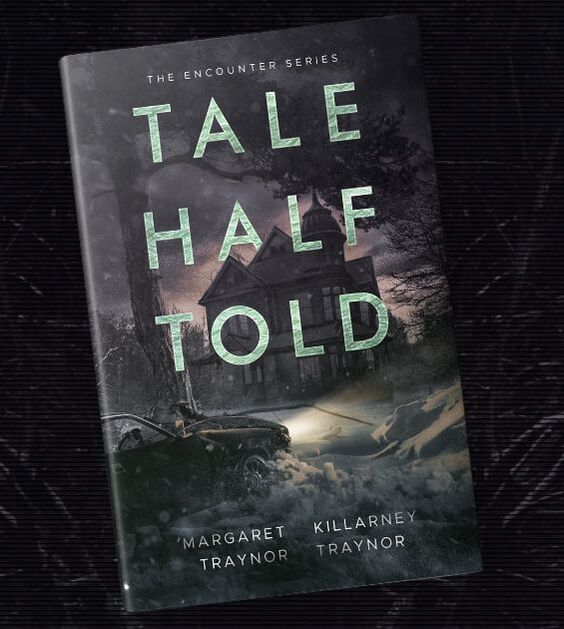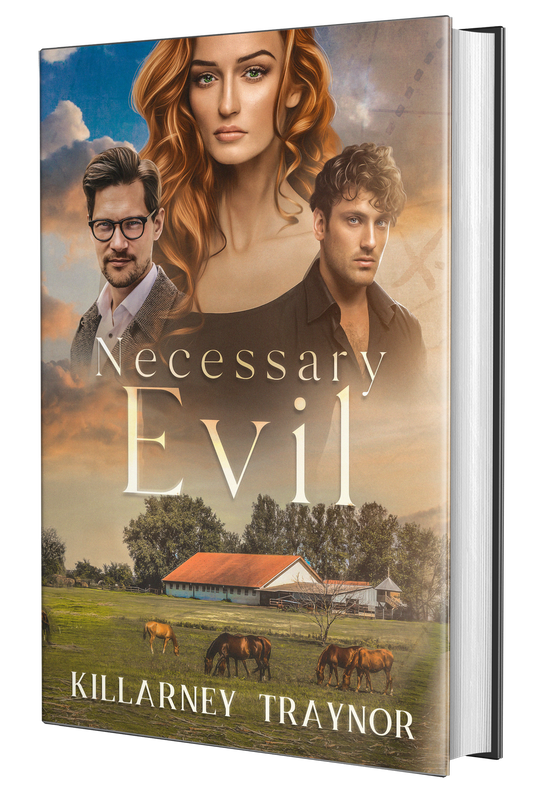|
In this sneak peek from Jenny Goodnight, Jenny, a burnt-out missionary, has just arrived in the small town of Legacy, where her Uncle Matthew has started a small but controversial newspaper. As Jenny waits in her uncle's print shop to greet her uncle for the first time in a long while, something happens to disturb the peaceable reunion: 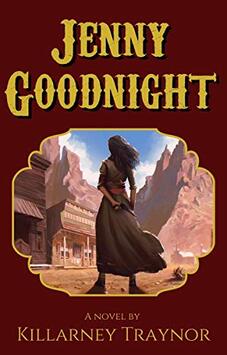 How long I waited, I can’t say. Time stretched out until I lost track of it. My head grew lighter until it seemed ready to float away. My legs were heavy, like blocks of wood, and there was a general fogginess about my ears that blurred what few sounds there were. I was slipping away again – dreams beckoned with dark arms. Then, just I was on the verge of falling asleep properly, an explosion occurred. I exaggerate, of course. It was merely the front door bursting open under someone’s impatient shove – but it might as well have been an explosion from the way it made my heart skip a beat and shook me out of my reverie. The door slammed back against the wall, making the windows rattle. A big, bulky man stormed past me. His boots hit the floorboards like weights, and when he slammed his large fist down on the counter, everything on it shook and danced the jig. “Goodnight!” the man roared. “Goodnight, where are you?” I caught my breath. The man’s voice was as big as his presence. He was dressed in the usual cowboy gear – blue jeans, a faded button down, boots curiously spur-less, and a hat which he pulled off to reveal a head full of dark hair. He was coated in dust and grime and might have been just any no-account worker, except for his good quality leather vest and the hand-tooled leather belt carrying his six-gun – both too expensive for the ordinary ranch hand. I jumped when his fist struck the counter again. “Dammit, Goodnight, don’t make me come in there after you!” He tossed his hat on to the counter, freeing his gun hand. It was then that I saw the newspaper, clutched tight in his fist. The white knuckle grasp on the newspaper, the rigid clench of his jaw, and the tension of his big shoulders radiated not only outrage, but the ability to act on it. This was a very dangerous man. Slowly, lest he catch sight of me, I bent down towards my carpet bag. “John Henry!” The call came, not from my uncle’s office, but from the open doorway behind me. A slim man stood there, also dusty and breathing heavily. The big man at the counter whirled around and pointed at the new figure. “Stay out of this, Olsen,” he threatened. He saw me then and I froze, bent at the waist over my carpetbag. His eyes raked over me, a brief but penetrating evaluation. Then he looked back at Olsen. “I’m just going to have a friendly chat with Mister Newspaperman here.” He turned and pounded the counter once more. “Goodnight!” “This ain’t no way to do it,” Olsen said. He pushed the hat back from his sun-weathered face and stepped cautiously into the room. “Let Schuyler handle it – that’s what you pay him for.” That only seemed to enrage the big man more. He slammed his palm into the counter (I was surprised that the board withstood such punishment) and roared, “This is a family matter and I’m not paying any lawyer to do what I can do myself. Goodnight, are you coming out here or am I coming in there?” I fumbled with the catch on the carpetbag. Then the office door opened and Matthew Goodnight emerged. A decade had passed since I had seen my uncle, but I would have known him anywhere. The fearless smile, the sharp blue eyes, the almost military carriage were all so reminiscent of my father that, under other circumstances, I might have had a misty moment. But Uncle Matthew was not my father and he had changed with the passage of time. Though his good looks remained, his features had softened and his face showed shades of cream and pink beneath the ever-present tan. There was something disheveled about his person, as though he no longer cared so much for appearances. He and my father shared the same feckless courage in the face of danger and he displayed it now, stepping out of his office as casually as if this were a social call. “Ah,” he said, carefully shutting the office door behind him. “Mr. Evans – to what do I owe the pleasure?” Evans? I did a double take. So the big man beating the counter was John Henry Evans, a member of the Evans clan I’d heard so much about. It explained the swagger, Olsen’s deferential manner, and Evans’s air of outraged dignity. It was his brother, Ben, who was running for office and it was their mother who was running the campaign. His family had founded this town and they weren’t accustomed to be being argued with or challenged. They were, in short, precisely the kind of people most likely to provoke my uncle’s ire. “You know what a firebrand crusader your uncle can be…” Aunt Alice always said that Uncle Matthew had the looks of a politician and the manner of an Irish pugilist with a sense of justice that would have impressed Solomon himself. It looked as though that moral courage was about to be reckoned with. Matthew Goodnight didn’t act like a man afraid. His voice was the same as I remembered from childhood – a blend of formality and superiority – and he smiled up at the big man as though he wasn’t concerned in the least. It was not calculated to be conciliatory and it had the expected effect. The big man slapped the newspaper down on the counter with such force that even Uncle Matthew jumped and Olsen took a half step forward. Evans pointed at the open page. “What do you mean by this, Goodnight?” he demanded, through gritted teeth. Uncle Matthew leaned over to look. “That,” he said, “is an editorial, an opinion piece. It is common in all papers, and it is usually meant to stir thought and to comment on recent events.” He flicked some dust from his jacket. “It’s a pack of lies, is what it is,” Evans said. “You came just short of calling my father a murderer!” Olsen took another cautious step forward. Uncle Matthew grinned. “I stopped short enough so that you won’t have a case if you try to sue this paper for libel. Not that you would or could, anyhow. Neither you nor your mother or your brother or his pretty little wife want to risk any of this going to court, do you?” He had barely finished when Evans grasped him by the shirtfront and drew him half-way across the counter until they were nose to nose. Olsen squawked, but didn’t try to interfere. I gasped and rose before I remembered what I was doing. “Now, you listen here.” Evans’ voice was low and dangerous. “You leave my mother and brother alone. If you’ve got a problem with the Evans family, you go through the court system, when and if you ever get the evidence. Do you understand me, Goodnight?” Matthew was as helpless as a rag doll in his grasp, but he eyed the big man with a steely gaze. “You couldn’t be more clear, Evans,” he said. Evans dropped him. Uncle Matthew recovered quickly, straightening his shirt front. Olsen relaxed, until Evans asked, “You’ll print a retraction, then?” Uncle Matthew laughed. “Retraction? You listen here, Evans, this paper doesn’t apologize for its opinions. We apologize for errors in facts, but never for our interpretation of them. No one asked your brother to make this foolish attempt at public office and someone should have warned him that all candidates are subject to scrutiny. If the precious Evans name doesn’t hold up under it, that’s not my fault. Tell your mother, the grand lady herself, to keep a tighter leash on Ben – better yet, make him drop this whole run.” “Not on your life,” Evans said. “The Evans family has nothing to be ashamed of, Benjamin the least of all.” “Oh, he’s too young to have done too much harm,” Uncle Matthew agreed. “But you might want to warn your mother that all good investigative reporters dig into the backgrounds of candidates and their families. I’m famous for my excavations, you know. The skeletons in your family closet had better be buried pretty deep if you don’t want me to find them.” “You’re a damned fool, Goodnight,” Evans said. His hands were balled into fists, his knuckles white under the pressure. “I’m just repeating what everyone else is already thinking. Twenty-two years ago, your father, Jacob Evans, and Ezra Jones, his partner, rode into this valley to look for gold. Five months into the search, up in the hills, Jones was bitten by a snake and your father was just a little too slow getting him to the doc – something about his horse stumbling and dying on the way. A month later, he finds ore in those same hills and is suddenly the biggest man this side of the Mississippi. And he doesn’t have to share it with anybody. All I’m suggesting here,” he laid his hand on the offending paper, “is that it was awful lucky for your old man: that snake bite and that accident with the horse.” Olsen whistled and half turned. My hand found what it was looking for. Buried under layer of calico, the smooth heft of the pistol grip filled me with reassurance and a trickle of fear. I always kept my revolver loaded with one empty chamber so it wouldn’t go off by accident. Wrapping my hand around it, I pulled myself back into an upright position, careful to keep my hands hidden in my skirts. Evans put both hands on the counter and leaned in. “You’ve got an accusation to make, newspaperman?” he asked. His voice was low, slow, and dangerous, and my pulse jumped. “Why don’t you just make it to my face and quit hiding behind that paper of yours?” “I’m just asking questions, John Henry…” “You call me Evans, Goodnight. Mister Evans.” “…and I’m not the only one who’s asking these questions.” Uncle Matthew leaned forward and even from that distance, I could see the dangerous glitter in his eyes. My hands began to sweat, slicking up the grip. My uncle said, “Now, folks around here have been asking a very logical question: Was it just luck that caused that snake bite and that horse to stumble? Maybe it was. But if you, the great John Henry Evans of the Evans Empire, are so sure this is the truth, why would a little thing like this opinion piece bother you, eh? If your father was the man you claim he is, if there isn’t a shadow of a doubt that he did all he could to get his partner to the doctor, that he had no idea of the ore up in those hills, if this was just one huge lucky break, why would you take time out of your busy day to come down here and threaten me?” “Goodnight, I’m a patient man…” Evans said warningly, but Uncle Matthew didn’t let him finish – he just leaned in further. “The only reason I can think of, John Henry, is that you yourself aren’t all that sure. You have doubts too. Did the horse really die of an accident? Was Jones even bitten in the first place? Or did your father decide that he didn’t want to share the ore up in those hills, so he killed his partner to keep it all for himself? Does your mother know-?” He never finished the sentence. Evans’ fist flashed and Uncle Matthew’s head snapped back with a sickening crack. Olsen cried out and jumped forward as the newspaperman dropped behind the counter. Evans was half-way across the counter when I found my feet and made my voice ring out across the room. “Now, you just hold it right there, Mr. Evans.” I doubt he would have stopped had I not accompanied my words with the ominous sound of the hammer of a Remington New Model Army .44 being drawn back... Order Jenny Goodnight Now!
0 Comments
I've decided to start a new feature for Fridays - Every other Friday, I'll showcase a snippet from either a work in progress or an old manuscript, a new short story, or random poem or scene from a never-finished book. If you like what you read, be sure to leave a comment below! Today's #FridayReads is from a work-in-progress tentatively called Jenny Goonight. It's a western about a travel-worn missionary woman who goes to visit her uncle, famed Civil War reporter Matthew Goodnight, in the town of Evanston, only to find her uncle embroiled in a power struggle with Varina Evans, wife of the town's founder. But Matthew isn't the man Jenny thought she knew and things go from bad to worse when a body turns up and Jenny finds herself accused of the killing. In this scene, Varina Evans hears some disturbing news and turns to her son, the quick tempered John Henry, for advice. 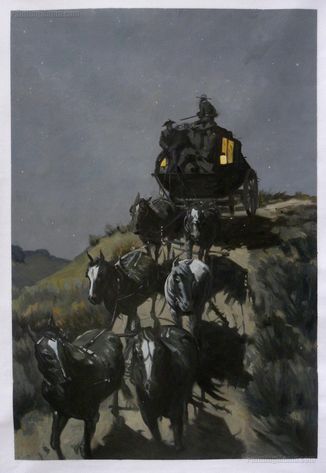 Chapter: Varina Lee Evans stood in a warm glow of the light, watching as the buckboard disappeared into the gathering darkness. Elizabeth and Josie Walsh, the wife and daughter of the general store owner, had come to pay a social call. At least, that was the reason Josie understood for their coming and it was the excuse that both Varina and Elizabeth would use, should anyone ask. Elizabeth had come for advice, advice that she could ask of neither the Pastor nor from her husband, Elliot, and she was not Catholic that she could confide in a priest. That left, very naturally to her mind, the Widow Evans. Varina Evans and Elizabeth Walsh were not what people might refer to as bosom friends. In fact, there was no one in town that could claim that relationship with Varina, unless it was her daughter-in-law, Helen. It was not close-friendship that brought Elizabeth to Varina, then, but a sort of fealty. The Evans were the founders of Evanston, the owners of the largest spread, and, according to most, the de facto rulers of the town, a story that Varina and both of her sons vehemently denied. But distance themselves as they might, people still thought of them as the chief family in town and when there was a civic problem, the Evans were usually the first turned to. Darkness closed around the buckboard and the rattling sound faded as the two women drove back to town. Varina thought, It wasn’t too long ago when such a short journey would have been too dangerous for two unarmed women. How fast things have changed. Now the dangers were different. From somewhere in the house, a door slammed heavily and she heard her son’s voice echoing through the rooms. John Henry had returned and from the sound of his voice, he’d seen the editorial, too. She left the relative peace of the darkened porch and went inside. The Evans mansion, as it was called by the locals, was an enormous, rambling structure that combined the practical needs of a ranch headquarters with the style of a Southern plantation house. The over-sized rooms were decorated with rich wall paper and plush carpeting, ornate candelabras, and heavy furniture. There was a piano in the parlor and a balcony outside her bedroom. Her deceased husband John had done his best, in a heavy-handed fashion, to provide her with a house that was like the one she’d grown up in. He'd succeeded only in reminding her how different life out west was from the one she’d known. John Henry was in the living room, standing before the fire place, rubbing his chin. He was dusty and grimy from the road, and the full day and he looked as though he’d love to put his fist through the wall. Trigger Olsen, one of their senior hands, was present too, running his hat through his hands. She stopped in the doorway and nodded to Trigger. “Good evening, Trigger,” she said. “You two are working late tonight.” “Yes, ma’am.” Trigger bobbed his head, glancing at John Henry as he did so. “We, uh, ran into some trouble in the north pasture.” John Henry looked sharply at him. “Well,” Varina said evenly, “no matter. We kept dinner warm for you. It’s waiting in the kitchen.” Trigger waited for John Henry’s nod before scampering off. He was too well acquainted with the Evans to want to be in the middle of a family discussion. When he was gone, Varina went and sat in the armchair, lowering herself carefully and smoothing her skirts as she did. John Henry kept his eyes on the fire place. The air chilled at night, so a small fire was always started at the end of the day. With Helen expecting in a few short weeks, the extra precaution was considered even more necessary. When John Henry didn’t speak, Varina did. “The north pasture?” she asked. John Henry seized the poker and stabbed at the logs. “Broken fence again,” he muttered. “We patched it. Thomas around?” “He’s upstairs, with Helen.” She waited another moment, then said, “I understand you paid a call on Matthew Goodnight this afternoon.” With a growl, John Henry threw the poker back into the stand and began to stride about the floor impatiently. “According to Josie Walsh, it didn’t go well,” Varina ventured. “Josie Walsh!” he said, with disdain. “What does she know about anything?” “She was under the impression that someone pulled a gun today, John Henry. That someone pulled a gun on you after you attacked Matthew Goodnight.” He stopped in front of her. “I couldn’t let him get away with printing that article,” he said. “Not when it’ll affect Thomas. You know it’ll hurt his chances in the election – it’ll hurt his chances with anything.” She looked up at him levelly. It was moments like these that he looked most like his father – a big man. Too big, she sometimes thought. “And do you think he’ll print a retraction now?” she asked, ice in her tone. He hesitated, then turned away, only just refraining from swearing. “We can’t just let him do this!” he muttered through gritted teeth and his fist came down on the mantelpiece, making the china dolls dance. “Something must be done!” Varina Evans waited a few moments. In dealing with John Henry, she found that some of the techniques she employed on her husband were most effective. No one would have accused the late John Thomas Evans of being a whipped man, but then few knew Varina very well. And though the son was very much like the father, there was one difference: John Henry was much more bullheaded than John and try as she might, she could only influence, not control. He is much more like me than his father in that respect, she thought. He’s his own man. I can only do so much with him. He is like his father – but he is not John. She waited until she was ready, then said, “Elizabeth Walsh was here today.” John Henry turned, frowning. She watched his hands flex. “What did she want?” he asked. Varina drew in a breath and looked up at him steadily. “She came to tell me what I already knew. You’re right, John Henry. We have got to do something about Matthew Goodnight.” LIKE WHAT YOU'VE READ? DROP ME A NOTE AND LET ME KNOW!
In this series of reviews, Killarney tries to watch every John Wayne movie since Stagecoach and shares her finds with you. 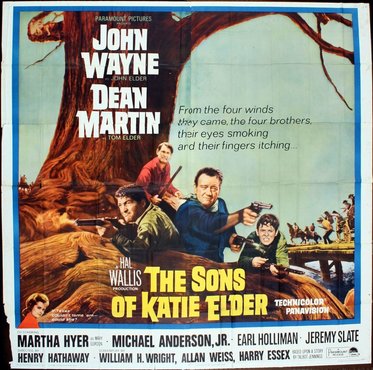 Synopsis: The four sons of Katie Elder return to their hometown of Clearwater for their mother's funeral, only to find that things have drastically changed. Their father died under mysterious circumstances, the family ranch is now owned by a man named Morgan Hastings, and their mother, a saintly woman beloved by all, died in suspicious poverty after sending her youngest son to college. The Elder boys want some answers, but Clearwater wants nothing to do with them and Hastings has a vested interest in getting rid of Katie's sons. The Sons of Katie Elder is western mystery that asks the question: once your reputation is established, can you ever recover? John Elder is a gunslinger, Tom a card shark, and Matt an unsuccessful hardware dealer, all of whom neglected their mother and youngest brother, Bud. While trying to uncover the truth about their father's death, they learn a few hard ones about themselves - and when Hastings sets them up for murder, their reputations might just be their undoing. Review: Sons is a wicked good movie about bad men learning how to be good ones - and wondering whether its possible to do so in a society that already knows you. Wayne already touched the subject in Angel and the Badman, but Sons carries it to a darker, more realistic place. Wayne's character is determined that his younger brother won't go the same route he took, while wondering if it's too late for him to lead another kind of life. It's serious subject is lightened by the brothers' rapport with each other, but the final act of the movie is intense. When the brothers are falsely accused of murdering the popular town sheriff and a lynch mob forms, Martin's character decides to kill the guard to escape, only to be stopped by Wayne's. "I ain't facing no lynch mob," Martin says. "You ran in New Orleans and that's why we're here," Wayne replies. "This time we face it. Katie's going to win this one." It's this test of character that will prove whether or not the brothers are worthy of Katie's faith in them. This isn't just a good John Wayne movie. It's a great movie period. Highly recommended. Best JW Quote:
Bud Elder: I'm going with you. I can draw pretty fast. We can be famous -- like the Dalton Brothers! John Elder: They're famous -- but they're just a little bit dead. They were hung! Best Swagger Moment: John Wayne comes in to find a hired gun harassing a local and takes the man out with one well-placed two-by-four. JW Wisdom: "This time we face it. Katie's going to win this one." Surprising Guest Star: James Gregory (General Ursus from Beneath the Planet of the Apes) plays Morgan Hastings. A very young Dennis Hopper plays his son. In which Killarney attempts to complete her New Year's Resolution of watching all John Wayne movies made after Stagecoach, for no better reason than she loves the Duke and wishes she lived out west. 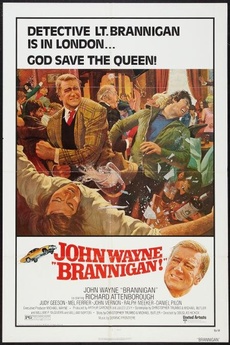 Starring: John Wayne and Sir Richard Attenborough Synopsis: Chicago cop Lt. Brannigan (Wayne) is sent to to the UK to escort crime-boss Larkin back to the US. But things get complicated once he arrives... and London may never be the same. Review: John Wayne in Great Britain. Sounds like a great idea, right? Exploding toilets. 'nough said. Give this movie a wide berth. (But if you're in the mood for a British take on a bar-room brawl, check out this youtube video and skip to about 1:40 in.) Key Moments:
Best JW Quote: Holding a gun on a thug: "I wouldn't. Unless you want to sing soprano." Best Swagger Moment: Kicking in the door of a thug's hideout and deadpanning: "Knock, knock." JW Moment of Wisdom: If there was one, I missed it. Surprising Guest Star: Sir Richard Attenborough's patience is constantly tried as Brannigan's UK connection, Cmdr. Swann. In which Killarney attempts to complete her New Year's Resolution of watching all John Wayne movies made after Stagecoach, for no better reason than she loves the Duke and wishes she lived out west. 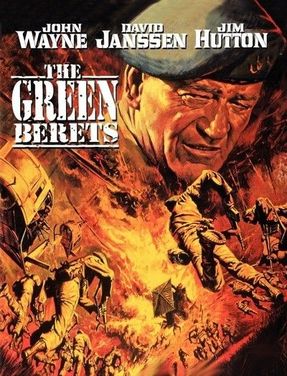 Starring John Wayne, David Janssen, and Jim Hutton Synopsis: Colonel Mike Kirby (John Wayne) leads two missions in Vietnam, aided by his team of Green Berets and accompanied by a skeptical reporter. Review: This is one of those movies that loses it's shock and awe value as time goes by. Written as a defense of American military action in Vietnam, The Green Berets is basically a story of an army under-seige: US troops, on a mission to aid the South Vietnamese against the North Communistic Vietnamese, faces vicious criticism at home and vicious resistance on the front. It's big and bold, but uneven and too long. The secondary plot, where the crew kidnap a North Korean General, should have been jettisoned and more attention paid to the way cooler but underplayed scenario of a remote camp, under attack in hostile territory. There are some genuinely touching moments (Jim Hutton's unofficial adoption of a little Vietnamese boy and the final scene with the boy and John Wayne are surprisingly effective) mixed with heavy-handed scene chews (George Tekai's interrogation of a Vietcong spy is both shocking and unconvincing). The Green Berets tries hard to prove that the Vietcong are a real and present threat, but they succeeded only in creating a sort of cartoon army that's impossible to fear or be impressed by. All that being said, I enjoyed the movie more than I thought I would. Ignore the politics and plot holes and it plays out like pure GI Joe, with daring feats, big guns, and bigger attitudes, (some of the scenes where they used real army vehicles and techniques were pretty cool - my inner teenager-self got a huge kick out of them), and John Wayne's signature swagger is front and center. If however, you haven't seen Rio Bravo or Cahill, US Marshall, skip this and watch one of those instead. Key Moments:
Best Quote: Beckridge (Janssen): Your brainwashed Sargent didn't sell me. Kirby (Wayne): Did sell you what? Beckridge: Didn't sell me on the idea that we should be in south east Asia. Kirby: Have you ever been to South East Asia? Beckridge: Well... no, I haven't. Kirby: Uh huh. Walks off, metaphorically dropping the mike. JW Moment of Wisdom: "It's pretty hard to talk to anyone about this country 'til they've come over here and seen it." Best JW Swagger Moment: I can't decide between these two: 1. Making "Fall back! Fall back!" sound less like retreat and more like, "Take no prisoners!" or 2. Getting a helicopter shot out from under him, then immediately leading troops to relieve the besieged camp, still smudged with the ashes from the wreckage. (Have I mentioned that John Wayne is pretty bad-ass?) Most Surprising Guest Stars: George Tekei took a break from Star Trek to appear in this film as the overly enthusiastic Captain Nim and Jim Hutton (aka TV's Ellery Queen) plays Sgt. Petersen, the scrounger-with-a-heart. In which Killarney attempts to complete her New Year's Resolution of watching all John Wayne movies made after Stagecoach, for no better reason than she loves the Duke and wishes she lived out west. 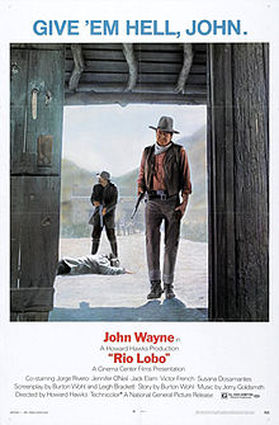 Starring: John Wayne, Jorge Rivero, Jennifer O'Neill, Jack Elam, and Christopher Mitchum. Directed by Howard Hawks Brief Synopsis: After the Civil War, Col.. Cord McNally (Wayne) searched for the Union traitor who betrayed his unit and caused the death of close friend. Helping him are two former Confederates (Rivero and Mitchum) and the three converge on the Texas town of Rio Lobo, where a corrupt sheriff is blackmailing and strong-arming his way into becoming the biggest landowner in the county. Review: For those of you not conversant in Wayne lore, Rio Lobo is the second variation of Hawks' classic Rio Bravo (the Duke's answer to High Noon), in which a small town sheriff stands against a superior force of outlaws. The first variation was El Dorado, - so close in story that it was practically a remake - which also starred Christopher Mitchum's father, Robert. Rio Lobo is the weakest entry of the three, but it still has it's moments. The opening sequence, where the Confederates, acting on the spy's information, hijack a train carrying Union gold, is intense, and the second half is traditional western fun, especially when Wayne and Rivera meet the spunky Shasta, mourning the murder of her friend by the town's corrupt sheriff and the independent Amelita, who harbors her own grudge. John Wayne plays the older, gruff loner and there are lots of shout-outs to his older movies, but the younger generation are given plenty of time and action. The women are strong, but underused, and the bad guys are somewhat one dimensional, but over-all it's a fun movie and it looks like they had a good time making it. John Wayne, kinda like Jackie Chan, brings a lot of the same crew with him in every movie and this one is no exception: almost every side character I recognized from his other movies. In short, not one of his best movies, but still a blast to watch. Key Moments:
Best JW Quote: "Ketchum, we promised you in a trade. We didn't say what condition you'd be in." Best Swagger Moment: On his way to the final showdown, John Wayne trades the ordinary rifle he carries for his signature one with the modified lever loop, saying with a satisfied grunt, "That's better." JW Moment of Wisdom: (Talking to the ex-confederates about the gold robbery and the spy that lead them to it): "What you did was an act of war - what he (the spy) did was treason." Most Surprising Guest Stars: Victor French (aka Mr. Edwards from Little House on the Prairie) is the spy that John Wayne beats the tar out of. Plus, Santa Claus (aka: David Huddleston) plays the town's dentist! 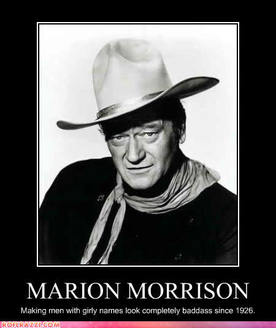 I'm a huge John Wayne fan. It's no secret, really. I was introduced to his movies as a child and to this day, in a pinch, I still find myself thinking, What would the Duke do? (That is, when I'm not thinking, What would Maureen O'Hara do? I'm an old-fashioned kind of girl, I guess.) Anyway, I'm a fan, but I'm embarrassed to say that it was only last summer that I saw Big Jake and realized just how many of his films I still hadn't seen. Hence, my sort-of-unofficial New Years Resolution is to remedy this: specifically, to see all the movies he made after Stagecoach, his breakthrough role. And since my other sort-of-unofficial resolution was to focus on more variety and interesting blog posts, I've decided to share my review of these adventures - which should prove to be interesting, because, as much as I love John Wayne, I'll be the first to admit that when he makes a bad movie, it really reeks. (See - or rather, avoid at all costs - Donovan's Reef.) Sit back, enjoy, and, if you disagree with my analysis of these cinematic classics or stinkers, be sure to comment below! First up, The Longest Day: 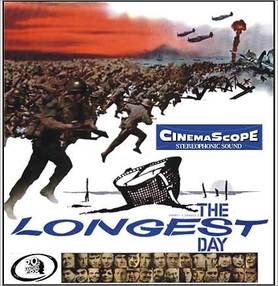 Released 1962 by 20th Century Fox Starring: John Wayne, Robert Mitchum, Eddie Albert, Robert Wagner, Sean Connery, Red Buttons, Richard Burton, Roddy McDowell, ad infinitum... Directed by Ken Annakin, Andrew Marton, Berhard Wicki, Gerd Oswald, and Darryl F. Zanuck Brief Synopsis: A sprawling epic about the events of D-Day, told from both the Allied and the Axis points of view. Review: This movie dances on the line between entertainment and docudrama, keeping it's eye strictly on the goal, which is to tell, in a respectful way, the story of the Normandy invasion. It's big, it's ambitious, and it covers lots of ground, from the frustration of the German high command, who cannot get permission to move, to the terror of the allied ground troop, some lost, some wounded, all terribly out-gunned. The scope is really awesome and the direction is terrific, especially the air shots: a devastating strafing scene in one instance, a losing battle in another. Its a thorough (though I'm told not wholly accurate) portrayal of a land under siege. Some reviewers found the all-star cast a distraction and they have a point. But in a movie like this, dealing with so many POVs and characters, knowing the actors had the merit of making me invest in the action. Young Robert Wagner, for instance, was too new a name and might not survive scaling the cliff. When Private John Steele is caught on Ste. Marie Eglise bell tower, I was concerned because I liked Red Buttons. The familiar faces made the soldiers feel more like what they would have been in actuality: men and boys that you knew, in varying ways, from back home. John Wayne isn't in this much (by necessity, as the cast is so huge), but he makes the most of his time on screen. He's at his most macho-American, playing a paratrooper who's crew is dropped 5 miles away from the target area and refuses to let neither the distance, not his freshly broken ankle stop him from getting to his appointed place. He rough, tough, gruff, and demanding - and almost broken when he comes upon the massacre (exaggerated for this movie) at Ste. Marie Eglise. Robert Mitchum nearly steals the movie as Brig. General Cota, who, pinned down on one of the beaches, makes an impassioned rallying speech that made me want to throw up my hat and cheer. But this movie doesn't often resort to cheap macho calls or flag-waving simplicity: it's largely the story of determined men, fighting over occupied territory. The storytellers want to arouse your sympathy, not for the Americans or even the allies, but for the men, the individuals on both sides, who fought and died that day. (This being said, the Germans were portrayed far less sympathetically than the allies - this was definitely a movie made by the winning side.) Two odd casting choices stand-out: Roddy McDowell (who I love and is the only reason I watched Cleopatra) plays an unconvincing GI, reminiscing about his life back home with his father in America. His accent is just a little to European to pull it off. More startling is the casting of pre-Bond Sean Connery as a comic-relief Irishman. I had to laugh when he, barely disguising his Scottish bur, makes a condescending remark about bagpipes. The Longest Day will not go down as my favorite Duke movie (Rio Bravo and McLintock! vie for that honor), and it doesn't tell you anything new about World War II or it's participants, but it's a well-spent 3 hours.
Agree? Disagree? Let me know down below! |
The BlogWelcome to Categories
All
|
Copyright © Killarney Traynor
All Rights Reserved.
No part of this website may be reproduced without
the Owner's express consent. [Backlinks allowed.]
All Rights Reserved.
No part of this website may be reproduced without
the Owner's express consent. [Backlinks allowed.]

